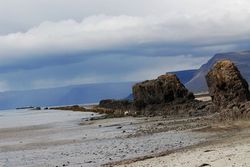Færsluflokkur: Dægurmál
Þriðjudagur, 18. maí 2010
Draumur fyrrinóttar var ráð-gáta og skilaboð
Fyrir þá sem áttuðu sig ekki á að bloggi gærdagsins hjá mér.
Draumur sá sem mig dreymdi var mjög sérstakur. En steinanir voru sko ekki einn eða tveir heldur löng röð báðum megin (við gangstéttarbrúninar) eftir endilöngu Austurstræti. Alveg úthöggnir en frekar litlir þó, ca. 1.5 m á breidd og 1,0 m á hæð. Ég var að hlaupa á milli þeirra frá Eymundsson í áttina að Lækjartorgi.
Útskýringar á Bautasteinum:
"Bautasteinar voru einnig notaðir sem leiðarmerki og gegndu sama hlutverki og vörður hér á landi,"
"Bautasteinar voru einnig settir upp til minningar um persónur"
"Farbauti og hylbauti eru einnig gömul líkindaorð um ráðendur."
"Í Hávamálum segir m.a.: "sjaldan bautasteinar standa brautu nær, nema reisi niðr at nið". Vísar það til þeirra steina er varða alfaraleiðina líkt og í Róm til forna"
Samanber í draumnum í áttina að Lækjartorgi eða Lækjargötu.
Nú skal hver ráða sitt.
Draumurinn hér aftur:
Í nótt dreymdi mig nokkuð sérstakan og ákveðinn draum um að götur Reikjavíkur væru allar þaktar stórum steinum og mörgum þeirra sérstaklega röðuðum upp eftir einhverskonar brautum. Það var eins og það væri einhver sérstök hátíð í gangi og í einum af atriðunum var ég þátttakandi í einhverskonar hlaupaleik meðfram steinum eftir öllu Austurstræti. En fullt af fólki var inni á sjálfum Austurvelli.
Enn nákvæmari lýsing:
Ég var að hlaupa eftir og milli raða af Bautasteinum meðfram gangstéttinni. En litlir venjulegir steinar voru út um allt á öðrum stöðum.
Dægurmál | Breytt s.d. kl. 09:29 | Slóð | Facebook | Athugasemdir (0)
Laugardagur, 23. janúar 2010
Siðferði íslendinga + gagn og gaman + 1 leikur + góða slóð á smá leiki
Ég bara verð að skrifa um þetta! Blogg er jú líka til að skrifa um hvað kemur upp í hugann hverju sinni.
Ég hef verið að velta því fyrir mér hvort við íslendingar eigum það virkilega skilið að Ísland nái sér á strik á ný. Ef við getum þá náð því! Mér finnst svo miklar eftirreitur úti í þjóðfélaginu af ýmsu sem miður er síðan að óðærið var. Allur þessi hraði í samskiptum fólks. Þar sem meðal annars sumt fólk gengur um með afskiptaleysi og vanvirðingu á umhverfi sínu á ferðum sínum hér og þar.
Í öllum þessum hraða í þjóðfélaginu eiga sumir það til að vanvirða lög og reglur sem eru settar á og ætlaðar til góðs í samskiptum manna. Ýmislegt má þar tína til.
Ég ætla mér að nefna hér tvö dæmi til að byrja með:
1. Fyrir um ca. 3 vikum síðan var keyrt utan í Bílinn minn. Ég var á vinstri akrein rétt áður en að ég kom inn í hringtorg til að komast þar á innri hringinn. Sá sem keyrir á mig sveygir Bílnum sínum yfir frá hægri akrein, yfir á þá vinstri og keyrir beint utan í hægra frambrettið á mínum Bíl. Áreksturinn hefði orðið meiri hefði ég ekki tekið eftir hvað var að fara að gerast. En ég náði að beygja mínum Bíl aðeins til vinstri. Farsíma - árekstur! Einn af þeim miður mörgu.
Mér finnst það alveg gjörsamlega ótækt að saklaust fólk eins og ég og annað fólk sem er sér meðvitað um alla þessa hættu á Farsíma notkun í umferðinni, verðum einhver fórnarlömb fólks sem er algjörlega ómeðvitað hvað það er að gera í umferðinni og getur orðið valdandi kannski óbættum skaða á öðru fólki eða sér og sínum.
Mér finnst að ég verði að skrifa um þetta ljóta vandamál sem viðgengst í umferðinni og vekja athygli á hversu mikið vandamálið er því fólk sem talar í Farsíma meðan að það keyrir þarf að dreyfa sinni athygli á fleira en eitt í einu. En fáir eru það meðvitaðir um allt umhverfi sitt að geta notað öll sín skynfæri í einu. Það sést oft að fólk leggur af stað út af Bílastæðum talandi í Farsíma.
Ég hef orðið vitni af nokkrum svona Farsíma árekstrum á ferðum mínum í umferðinni. Fólk verður að átta sig hvað það getur orðið valdandi með þessum gjörðum sínum. Allir sem keyra Bíl bera mikla ábyrgð! Ekki bara á sér og sínum heldur og öllum öðrum sem eru á ferð í kringum það!
Það væri mjög slæmt mál að það fólk sem er talandi í Farsíma í umferðinni verði sjálft fyrir því að það verði keyrt á það af manneskju sem er talandi í Farsíma. Að slíkt atvik þurfi til að fólk vakni og verði sér meðvitað. Ég ætla rétt að vona að fólk átti sig á því atriði að það er alltaf möguleiki að svona árekstrar geti alveg eins komið fyrir það sjálft.
Ekkert símtal er mikilvægara en manneskjan sjálf! Í öllum Farsímum sjást símanúmer þess sem hringdi!
***********
Hugarleikfimi:
***********
Til gagns og gamans langar mig til að setja hér inn tvær færslur.
Á stað einum á Internetinu er hægt að ná í ýmsa smærri leiki. Þetta er góð vefsíða þar sem hægt er bæði að leika sér á staðnum eða sækja leiki í tölvuna sína, setja upp og leika sér.
Slóð: http://www.myplaycity.com
Þarna á meðal er einn leikur sem kallaður er "Pestering Birds" sem gengur út á skjóta niður Fugla sem færast niður tölvuskjáinn. Svona svipaður (ath. í arcate hlutanum) og leikurinn: Bubbles en miklu fjölbreyttari og skemmtilegri!
Svona til gamans og af hugdettu langar mig til að skjóta því að þeim sem þekkja þessa leiki að loka augunum og telja hvert skot í einu um leið og litinn. Athugið hvernig virknin verður![]() Ég á við að þú sér rauða kúlu og telur um leið, bláa telur um leið, rauða telur um leið osfrv. allt á miklum hraða með augun lokuð. Þar að segja þú segir litinn á nákvæmlega sama tíma og hann birtist þér í huganum.....
Ég á við að þú sér rauða kúlu og telur um leið, bláa telur um leið, rauða telur um leið osfrv. allt á miklum hraða með augun lokuð. Þar að segja þú segir litinn á nákvæmlega sama tíma og hann birtist þér í huganum.....
Þetta er svona viðbragðs æfing fyrir heilann.
2. Siðferði á lágu plani?
Ég verð stundum var við það að fólk gengur um umhverfi sitt eins og því sýnist án tilllits til annars fólks. Ég get nefnt hér dæmi um þá sem starfsfólk á vinnustöðum sem leggur Bílum sínum í Bílastæði viðskiptavini í stað þess að leggja í Bílastæði starfsfólks. Smá siðblinda? Já, að vissu leiti má segja svo því að stæði fyrir viðskiptavini er jú eingöngu stæði fyrir viðskiptavini.
En þetta fólk sem gerir svona hluti svarar því til að þeir séu líka viðskiptavinir. Jú, þeir eru viðskiptavinir þegar að þeir eru ekki starfsfólk á staðnum. Þannig að ef ég sem starfsmaður er allan liðlangann daginn á Bílastæði svæðisins þá er ég að nota Bílastæði sem starfsmaður en ekki viðskiptavinur.
Allt fólk mætti gera sér grein fyrir að það er ekki eitt í heiminum og heimurinn snýst ekki eingöngu um það og þeirra gjörðir. Allar gjörðir hafa áhrif á umhverfið og annað fólk í því. Þannig ber hver einasta manneskja ábyrgð á því umvherfi sem það er í. Nefna mætti dæmi um að fólk sem leggur Bílum sínum í stæði viðskiptavina eru oft að taka stæði af þeim sem eiga kannski erfitt með gang eins og tildæmis eldri manneskjur.
***************
Önnur hugarleikfimi![]()
***************
Mér datt svona í hug í gamni mínu að setja inn smá stuttan hugaræfingu sem kemur fyrir að ég stunda![]() einstaka sinnum.
einstaka sinnum.
Ímyndaðu þér að þú sérst inn á miðjum velli í stórum Handboltasal með sætin allan hringinn (eða sporöskjulaga). Með lokuð augun áttu að ímynda þér að þú sérst að horfa upp eftir og meðfram allri sætaröðinni, allan hringinn. Byrja fremst hægra megin og fara eftir sólargangi allan hringinn. Færa sem sagt augun til og sjá fyrir þér fara eftir öllum sætaröðum allan hringinn. Allt án þess að snúa hausnum.
Hvernig tekst þér þetta? Tekst þér að horfa bak við þig í huganum? Er það sem er fyrir aftan þig með á ferð þinni hringinn með augun lokuð? Þetta kostar dálitla æfingu að sjá þetta fyrir sér.
Hversvegna er ég að minnast á þetta? Tildæmis tilæ þess að vekja athygli á því að það er allt í lagi að leika sér í svona einhverju til að þjálfa og mæla hvað þú ert meðvitaður um þig og umhverfi þitt........
Dægurmál | Breytt s.d. kl. 13:14 | Slóð | Facebook | Athugasemdir (0)
Miðvikudagur, 21. október 2009
Consider Phlebas
Ríkisstjórnir skuli leggja niður ómannúðarstefnu sinni við gerð fjárlaga.
Nú þarf að huga að almenningi, lágtekjufólki, öryrkjum og öldruðum því að á tímum kreppu og sérstaklega þessari kreppu með hennar rosalegu miklu skuldastöðu á allur vandi ekki að þurfa að lenda á þessum hópum. Einmitt vegna þess að þessi staða er komin til vegna aðgerða fárra fjárglæframanna bankanna.
Undanfarin ár og áratugi hafa stjórnmálamenn ítrekað stórminnkað og skorið niður kjör öryrkja, aldaðra og almennings í neðstu tekjuþrepunum við gerð fjárlaga. Til þess má sérstaklega geta síðustu fjárlög og einnig þegar að stóridómur lent á öryrkjum árið 2000.
Það eru sjálfsögð mannréttindi fólks sem er að strita myrkanna á milli til að hafa í sig og á, að fá að lifa með tekjur sem er ekki alltaf verið að snusa af og skera undan af misvitrum stjórnmálamönnum sem mynda ríkisstjórnir þessa lands. Er þá átt við að fólk geti haft sitt viðurværi án þess að lenda alltaf í skuldastöðu vegna þess að tekjur eru orðnar minni en útgjöld og útgjöldin stækka því erfiðara er að losna út úr skuldabagga sem stækkar og stækkar en að halda utan um stöðu sem er í plús, í þeirri stöðu sem er ekki verið að ráðast á.
Í reynd er þetta mjög misráðið af ríkisstjórnum einmitt vegna þess að þær lenda inn í hringiðu atburða þar sem þarf að laga félagslega þáttinn aftur og aftur vegna þess að það er búið að skemma hann með fjárlagasnusinu á þessa hópa. Þetta er því ekkert annað en sjálfskaparvíti stjórnvalda.
En hvernig væri nú að fara að nota vitsmunina og losa sig út úr þessari hringiðu? Hvernig væri að fara að búa til stöðu sem ver kjör þessara áðurnefndu hópa? En slíkt væri alveg hægt með því að setja upp varnarsjóð sem ver kjör almennings! Og sá varnarsjóður væri skipt niður í flokka eftir launum og aðstæðum eins og vinnugetu og svo framvegis.
Í "Okkar Ísland" skjalinu er komið inn á þennan þátt og þar nefndir hinir ýmsu sjóðir sem hægt væri að setja í gang. Eins og tildæmis þessi varnarsjóður. En í framhald skjalsins útgáfa nr. 1.04 er verið að vinna að því að skrifa nákvæmar um hvernig hægt væri að setja í gang þær aðstæður þar sem svona sjóður væri hægt að setja í gang. En með því að skoða málin er ljóst að bestu aðstæðurnar væru þær að við breyttum fyrirkomulaginu og hættum alveg með fjárlög heldur snúm blaðinu við og rekum Ísland sem Risa-Fyrirtæki með tengslum við smærri fyrirtæki inni á svæðum landsins. Í nýjasta hluta skjalsins verður nánar komið inn á þetta atriði.
Ég er að vinna að nýjasta hlutanum en hef lítið komist áleiðis vegna lasleika að undanförnu. En það horfir allt til bóta.
*************************
Viðbót fært inn seinna:::::
Fyrirsögnin á þessum pistil er af nafni culture vísindaskáldsögu "IAIN M. Banks"
Sennilega er íslenska slanguryrðið: PLEBBI tekið af enska orðinu Phlebas og er merking orðsins að vera einn af almúganum.
Nafn vísindaskáldsögunnar hefur höfundur fengið úr næst síðasta erindi ljóðabálksins: "The Waste Land"
Að lokum þessa pistils set ég hér inn ljóðabálkinn "The Waste Land" (1922) eftir T.S. Eliot. Þessi ljóðabálkur er mjög áhugaverður að lesa og sérstaklega með mannlega þáttinn í huga.
Lesið sérstaklega partinn frá 110 til 140 og tvo síðustu kaflana.
Nam Sibyllam quidem Cumis ego ipse oculis meis vidi in ampulla pendere, et cum illi pueri dicerent
NOTES
- Not only the title, but the plan and a good deal of the incidental symbolism of the poem were suggested by Miss Jessie L. Weston's book on the Grail legend: From Ritual to Romance (Macmillan). Indeed, so deeply am I indebted, Miss Weston's book will elucidate the difficulties of the poem much better than my notes can do; and I recommend it (apart from the great interest of the book itself) to any who think such elucidation of the poem worth the trouble. To another work of anthropology I am indebted in general, one which has influenced our generation profoundly; I mean The Golden Bough; I have used especially the two volumes Adonis, Attis, Osiris. Anyone who is acquainted with these works will immediately recognize in the poem certain references to vegetation ceremonies.
I. THE BURIAL OF THE DEAD- Line 20 Cf. Ezekiel 2:7.
- 23. Cf. Ecclesiastes 12:5.
- 31. V. Tristan und Isolde, i, verses 5–8.
- 42. Id. iii, verse 24.
- 46. I am not familiar with the exact constitution of the Tarot pack of cards, from which I have obviously departed to suit my own convenience. The Hanged Man, a member of the traditional pack, fits my purpose in two ways: because he is associated in my mind with the Hanged God of Frazer, and because I associate him with the hooded figure in the passage of the disciples to Emmaus in Part V. The Phoenician Sailor and the Merchant appear later; also the 'crowds of people', and Death by Water is executed in Part IV. The Man with Three Staves (an authentic member of the Tarot pack) I associate, quite arbitrarily, with the Fisher King himself.
- 60. Cf. Baudelaire:
- Fourmillante cité, cité pleine de rêves,
- Où le spectre en plein jour raccroche le passant.
- 63. Cf. Inferno, iii. 55–7:
- si lunga tratta
- di gente, ch'io non avrei mai creduto
- che morte tanta n'avesse disfatta.
- 64. Cf. Inferno, iv. 25–27:
- Quivi, secondo che per ascoltare,
- non avea pianto, ma' che di sospiri,
- che l'aura eterna facevan tremare.
- 68. A phenomenon which I have often noticed.
- 74. Cf. the Dirge in Webster's White Devil.
- 76. V. Baudelaire, Preface to Fleurs du Mal.
II. A GAME OF CHESS- 77. Cf. Antony and Cleopatra, II. ii. 190.
- 92. Laquearia. V. Aeneid, I. 726: dependent lychni laquearibus aureis incensi, et noctem flammis funalia vincunt.
- 98. Sylvan scene. V. Milton, Paradise Lost, iv. 140.
- 99. V. Ovid, Metamorphoses, vi, Philomela.
- 100. Cf. Part III, l. 204.
- 115. Cf. Part III, l. 195.
- 118. Cf. Webster: 'Is the wind in that door still?'
- 126. Cf. Part I, l. 37, 48.
- 138. Cf. the game of chess in Middleton's Women beware Women.
III. THE FIRE SERMON- 176. V. Spenser, Prothalamion.
- 192. Cf. The Tempest, I. ii.
- 196. Cf. Marvell, To His Coy Mistress.
- 197. Cf. Day, Parliament of Bees:
- When of the sudden, listening, you shall hear,
- A noise of horns and hunting, which shall bring
- Actaeon to Diana in the spring,
- Where all shall see her naked skin...
- 199. I do not know the origin of the ballad from which these lines are taken: it was reported to me from Sydney, Australia.
- 202. V. Verlaine, Parsifal.
- 210. The currants were quoted at a price 'carriage and insurance free to London'; and the Bill of Lading, etc., were to be handed to the buyer upon payment of the sight draft.
- 218. Tiresias, although a mere spectator and not indeed a 'character', is yet the most important personage in the poem, uniting all the rest. Just as the one-eyed merchant, seller of currants, melts into the Phoenician Sailor, and the latter is not wholly distinct from Ferdinand Prince of Naples, so all the women are one woman, and the two sexes meet in Tiresias. What Tiresias sees, in fact, is the substance of the poem. The whole passage from Ovid is of great anthropological interest:
- ...Cum Iunone iocos et 'maior vestra profecto est
- Quam, quae contingit maribus', dixisse, 'voluptas.'
- Illa negat; placuit quae sit sententia docti
- Quaerere Tiresiae: venus huic erat utraque nota.
- Nam duo magnorum viridi coeuntia silva
- Corpora serpentum baculi violaverat ictu
- Deque viro factus, mirabile, femina septem
- Egerat autumnos; octavo rursus eosdem
- Vidit et 'est vestrae si tanta potentia plagae',
- Dixit 'ut auctoris sortem in contraria mutet,
- Nunc quoque vos feriam!' percussis anguibus isdem
- Forma prior rediit genetivaque venit imago.
- Arbiter hic igitur sumptus de lite iocosa
- Dicta Iovis firmat; gravius Saturnia iusto
- Nec pro materia fertur doluisse suique
- Iudicis aeterna damnavit lumina nocte,
- At pater omnipotens (neque enim licet inrita cuiquam
- Facta dei fecisse deo) pro lumine adempto
- Scire futura dedit poenamque levavit honore.
- 221. This may not appear as exact as Sappho's lines, but I had in mind the 'longshore' or 'dory' fisherman, who returns at nightfall.
- 253. V. Goldsmith, the song in The Vicar of Wakefield.
- 257. V. The Tempest, as above.
- 264. The interior of St. Magnus Martyr is to my mind one of the finest among Wren's interiors. See The Proposed Demolition of Nineteen City Churches (P. S. King & Son, Ltd.).
- 266. The Song of the (three) Thames-daughters begins here. From line 292 to 306 inclusive they speak in turn. V. Götterdammerung, III. i: The Rhine-daughters.
- 279. V. Froude, Elizabeth, vol. I, ch. iv, letter of De Quadra to Philip of Spain:
- In the afternoon we were in a barge, watching the games on the river. (The queen) was alone with Lord Robert and myself on the poop, when they began to talk nonsense, and went so far that Lord Robert at last said, as I was on the spot there was no reason why they should not be married if the queen pleased.
- 293. Cf. Purgatorio, V. 133:
- 'Ricorditi di me, che son la Pia;
- Siena mi fe', disfecemi Maremma.'
- 307. V. St. Augustine's Confessions: 'to Carthage then I came, where a cauldron of unholy loves sang all about mine ears'.
- 308. The complete text of the Buddha's Fire Sermon (which corresponds in importance to the Sermon on the Mount) from which these words are taken, will be found translated in the late Henry Clarke Warren's Buddhism in Translation (Harvard Oriental Series). Mr. Warren was one of the great pioneers of Buddhist studies in the Occident.
- 309. From St. Augustine's Confessions again. The collocation of these two representatives of eastern and western asceticism, as the culmination of this part of the poem, is not an accident.
V. WHAT THE THUNDER SAID- In the first part of Part V three themes are employed: the journey to Emmaus, the approach to the Chapel Perilous (see Miss Weston's book), and the present decay of eastern Europe.
- 357. This is Turdus aonalaschkae pallasii, the hermit-thrush which I have heard in Quebec County. Chapman says (Handbook of Birds in Eastern North America) 'it is most at home in secluded woodland and thickety retreats.... Its notes are not remarkable for variety or volume, but in purity and sweetness of tone and exquisite modulation they are unequalled.' Its 'water-dripping song' is justly celebrated.
- 360. The following lines were stimulated by the account of one of the Antarctic expeditions (I forget which, but I think one of Shackleton's): it was related that the party of explorers, at the extremity of their strength, had the constant delusion that there was one more member than could actually be counted.
- 367–77. Cf. Hermann Hesse, Blick ins Chaos:
- Schon ist halb Europa, schon ist zumindest der halbe Osten Europas auf dem Wege zum Chaos, fährt betrunken im heiligen Wahn am Abgrund entlang und singt dazu, singt betrunken und hymnisch wie Dmitri Karamasoff sang. Ueber diese Lieder lacht der Bürger beleidigt, der Heilige und Seher hört sie mit Tränen.
- 401. 'Datta, dayadhvam, damyata' (Give, sympathize, control). The fable of the meaning of the Thunder is found in the Brihadaranyaka--Upanishad, 5, 1. A translation is found in Deussen's Sechzig Upanishads des Veda, p. 489.
- 407. Cf. Webster, The White Devil, V, vi:
- ...they'll remarry
- Ere the worm pierce your winding-sheet, ere the spider
- Make a thin curtain for your epitaphs.
- 411. Cf. Inferno, xxxiii. 46:
- ed io sentii chiavar l'uscio di sotto
- all'orribile torre.
- Also F. H. Bradley, Appearance and Reality, p. 346:
- My external sensations are no less private to myself than are my thoughts or my feelings. In either case my experience falls within my own circle, a circle closed on the outside; and, with all its elements alike, every sphere is opaque to the others which surround it.... In brief, regarded as an existence which appears in a soul, the whole world for each is peculiar and private to that soul.
- 424. V. Weston, From Ritual to Romance; chapter on the Fisher King.
- 427. V. Purgatorio, xxvi. 148.
- 'Ara vos prec per aquella valor
- 'que vos guida al som de l'escalina,
- 'sovegna vos a temps de ma dolor.'
- Poi s'ascose nel foco che gli affina.
- 428. V. Pervigilium Veneris. Cf. Philomela in Parts II and III.
- 429. V. Gerard de Nerval, Sonnet El Desdichado.
- 431. V. Kyd's Spanish Tragedy.
- 433. Shantih. Repeated as here, a formal ending to an Upanishad. 'The Peace which passeth understanding' is a feeble translation of the conduct of this word.
Dægurmál | Breytt s.d. kl. 16:47 | Slóð | Facebook | Athugasemdir (0)
Föstudagur, 25. september 2009
Byrjun á smá ljóði - fyrsta erindi af Áfram Ísland fróma fold
Áfram Ísland þú fróma fold
sem fágætt er meðal þjóða
hver ótrauð byggjum oss jarðar hold
hvar öllum þegnum vor bjóða
skýringar:
fróma fold= heiðraða land
jarðar hold= jarðvegur, auðlindir
hvar= hvarvetna
Dægurmál | Slóð | Facebook | Athugasemdir (0)
Miðvikudagur, 16. september 2009
Ég er að setja í gang verðlaunasamkeppni um nýjan Þjóðsöng íslendinga
Verðlaunasamkeppni um nýjan þjóðsöng íslendinga
Þetta er ætlað sem samkeppni um ljóð sem mætti hugsanlega nota í þjóðsöng íslendinga í framtíðinni?
Við íslendingar eigum ekki neinn almennilegan þjóðsöng. Þessvegna langar mig til að nota þennan blogg vettfang minn til að setja í gang smá keppni í að semja nokkuð sem hægt yrði að nota sem nýjan þjóðsöng.
Hugsunin er að fá fólk til að taka þátt í að semja nýjan þjóðsöng með því að senda inn á bloggið mitt samið ljóð með rími, ásamt stuðlum og höfuðstöfum.
Veitt verða svokölluð stigaukandi verðlaun eftir þátttöku og styrkveitingu í málefnið. Þannig er í fyrstunni kr. 5.000 sem er borgað úr mínum vasa fyrir afnotarétt af besta ljóðinu. En verlaunaféð hækkar eftir því sem fé bætist í verkefnið. Hugsunin er að verkefnið standi í um mánuð......
Hér eru stigin:
Stig 1.
Besta ljóðið er keypt aðeins fyrir afnotarétt á bloggið mitt og er borgað kr. 5.000 fyrir afnot af besta ljóðinu á bloggsíðu minni. Eigandi ljóðs hefur þannig að öðru leiti allan einkarétt á ljóðinu sjálfur.
Stig 2.
Safnað yrði styrkveitingu fyrir önnur kaup á ljóðinu. Þannig að uppi á bloggi mínu koma upplýsingar um hversu upphæðin er orðin há.
Sá/sú sem tekur þátt getur þannig byrjað í Stigi 1 en færist sjálfkrafa upp um stig þegar að meiri peningar eru komnir í pottinn.
Hér koma síðan inn á bloggið mitt allar upplýsingar um hækkun á Stigum, þ.e. verðlaunafé.
Um ljóðið og þjóðsönginn:
Ljóðinu er ætlað að vera amk. 3 til 5 erindi og hvert erindi amk. 4 línur með rími, stuðlum og höfuðstöfum. Þó eru allar góðar tillögur velkomnar um smá breytingu þar á.
Setjið ljóðið ykkar í athugasemdir á samkeppnina og þau verða færð upp á bloggsíðuna hverju sinni.
Þau verða birt einu sinni en á Stigi 1 er keyptur afnotaréttur fyrir framtíðarbirtingu á bloggi mínu.
Ath. ef einhver vill gefa í verkefnið til að auka Stigið þá er það velkomið því hærra fé því meiri þátttaka!
Sendið mér línu á: gudni@simnet.is
Dægurmál | Breytt s.d. kl. 17:46 | Slóð | Facebook | Athugasemdir (8)
Mánudagur, 3. ágúst 2009
Nokkrar myndir frá sumarferð minni
Sæl öll sömul Ég er nú kominn til baka úr sumarferðinni, ferskur og hress. Tilbúinn í slaginn með nokkrar hugmyndir komnar á blað sem ég mun setja í gang á næstunni.
Ég er nú kominn til baka úr sumarferðinni, ferskur og hress. Tilbúinn í slaginn með nokkrar hugmyndir komnar á blað sem ég mun setja í gang á næstunni.
Ég fór alla vestfirðina og þaðan til Akureyrar á eina með öllu. Ferðin tók 9 daga. Hér eru nokkrar myndir úr ferðinni:
Dægurmál | Breytt s.d. kl. 20:23 | Slóð | Facebook | Athugasemdir (0)










 thjodarheidur
thjodarheidur
 heimssyn
heimssyn
 alit
alit
 aloevera
aloevera
 arikuld
arikuld
 asthildurcesil
asthildurcesil
 axelaxelsson
axelaxelsson
 axelthor
axelthor
 bjarnimax
bjarnimax
 bofs
bofs
 duddi9
duddi9
 einarbb
einarbb
 finni
finni
 fullvalda
fullvalda
 fun
fun
 gattin
gattin
 gun
gun
 halldojo
halldojo
 heidistrand
heidistrand
 diva73
diva73
 imbalu
imbalu
 jaj
jaj
 islandsfengur
islandsfengur
 jonl
jonl
 jonsnae
jonsnae
 jonvalurjensson
jonvalurjensson
 jensgud
jensgud
 juliusbearsson
juliusbearsson
 kreppan
kreppan
 kreppukallinn
kreppukallinn
 kreppuvaktin
kreppuvaktin
 krist
krist
 ksh
ksh
 launafolk
launafolk
 altice
altice
 lehamzdr
lehamzdr
 ragnar73
ragnar73
 saemi7
saemi7
 skalaglamm
skalaglamm
 socialcredit
socialcredit
 spurs
spurs
 svarthamar
svarthamar
 tbs
tbs
 theodorn
theodorn
 trassinn
trassinn
 vidhorf
vidhorf
 villidenni
villidenni
 vistarband
vistarband
 vignir-ari
vignir-ari
 ast
ast
 annabjorghjartardottir
annabjorghjartardottir
 borgfirska-birnan
borgfirska-birnan
 elnino
elnino
 zumann
zumann
 zeriaph
zeriaph
 don
don
 prakkarinn
prakkarinn
 maggiraggi
maggiraggi
 samstada-thjodar
samstada-thjodar
 fullveldi
fullveldi
 stjornlagathing
stjornlagathing
 postdoc
postdoc
 totibald
totibald